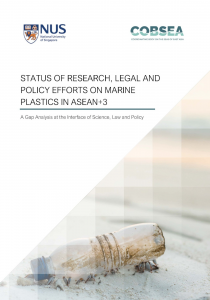Database of Research, Legal and Policy Efforts on Pollution from Marine Plastics in ASEAN+3
 NUS and the Coordinating Body on the Seas of East Asia (COBSEA), have conducted a comprehensive review of nearly 400 scientific publications on marine plastic pollution in 13 countries in South East and East Asia as well as legal and policy efforts by global and regional bodies and initiatives. The review includes a comprehensive report of published plastic pollution research, policies and initiatives in ASEAN+3 as well as a searchable database of research and a series of graphics. It is the first review and database of its kind for the region.
NUS and the Coordinating Body on the Seas of East Asia (COBSEA), have conducted a comprehensive review of nearly 400 scientific publications on marine plastic pollution in 13 countries in South East and East Asia as well as legal and policy efforts by global and regional bodies and initiatives. The review includes a comprehensive report of published plastic pollution research, policies and initiatives in ASEAN+3 as well as a searchable database of research and a series of graphics. It is the first review and database of its kind for the region.
The study, “Status of Research, Legal and Policy Efforts on Marine Plastics in ASEAN+3: A Gap Analysis at the Interface of Science, Law and Policy”, builds upon an earlier study by Lyons, Su and Neo (2019) titled “A review of research on marine plastics in Southeast Asia: Who does what?” which focused on ASEAN member states (Brunei Darussalam, Cambodia, Indonesia, Lao People’s Democratic Republic (PDR), Malaysia, Myanmar, the Philippines, Singapore, Thailand, and Vietnam). This new study provides an updated review and extends the geographic scope to three neighbouring Asian countries: the People’s Republic of China (China), Japan, and the Republic of Korea (Korea). They are referred to together as ASEAN+3. The study is divided into two parts.
Part 1 focuses first on the status of scientific research on and understanding of pollution from marine plastics in ASEAN+3, including a regional summary of status. Second, it reviews and discusses the mandates, approach and status of work by international and regional intergovernmental bodies as well as relevant regional public-private and fully private initiatives that seek to combat pollution from marine plastics.
Part 2 is a gap analysis between scientific research and information needs for policy-making purposes, with a particular focus on the Regional Action Plan on Marine Litter (RAP MALI) of the Coordinating Body of the Seas of East Asia (COBSEA) whilst considering also the work of other regional bodies. This part also discusses regulatory approaches and obstacles to combat pollution from marine plastic based on four reviews on this. Recommendations on research needed and ways to improve the science-policy-law interface are provided at the end.
This study was prepared by a research team from several research centres at the National University of Singapore (NUS) under the coordination of the Centre for International Law (CIL), support from the Coordinating Body on the Seas of East Asia (COBSEA), with support from the Global Partnership on Marine Litter (GPML) and the SEA circular project implemented by COBSEA and the United Nations Environment Programme (UNEP), as well as support by the Singapore Maritime Institute under CIL-MPA Oceans Governance Research Programme – Project ID SMI-2019-MA-03. The report was prepared with the aim of supporting and strengthening marine litter research and informing more robust policy making, in line with the COBSEA Regional Action on Marine Litter (RAP MALI) and other regional actions plans applicable in ASEAN+3.

